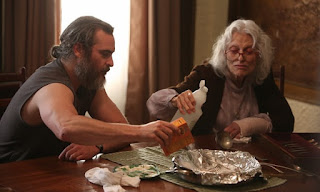"I Used To See The Beauty In This World. But Now I See The Truth..."
With the success of the premiere out of the way, the second episode of Westworld's second season this week dares to offer yet another barrel load of interesting questions and premises rather than attempting to answer those queries already remaining from the first season and notions furthermore established last week. With time-jumps a go-go, "Reunion" succeeds primarily in travelling even further beyond a moment explored in the first season, with the return of Jimmi Simpson's younger incarnation of William/The Man in Black and Ben Barnes' Logan both highlighting the initial introduction to the ways and means of Westworld's dreamlike capabilities and the ultimate decision made by the father figure of guest star Peter Mullan, whose fondness and respect for his step-son has resulted in a distracting familial wedge between the relationship between the two brothers in law. With the drastic change of time setting both before and after the events of the first season from the eyes of our two investors, the chance to see Delores in the "real world" set to the backdrop of some very familiar Blade Runner-esque musical arrangements follows on from her decision to outlay her past experiences in lands she considers to be too good for her human counterparts, and with her seemingly reminiscing her relationship with William outside of the park, the early indications of Delores' differences seem to have begun years before the host revolution which has now occurred.
In the present day, Delores' malevolent, murderous streak continues, with her aim of attempting to rebuild a sentient army of her own making landing her face-to-face with Maeve's own individual journey, a subplot which thankfully is not showered with the heaviest amount of interest this week, whilst her sudden awareness of the oncoming human threat results in her making it resoundingly clear that her endgame is not as crystal clear as one might have originally thought, with her declaration that her quest does not lead her to a particular place or destination but a weapon instead, one destined to destroy the human enemy that is now hunting her. With The Man in Black still ferociously enjoying his time in a now deadly environment, his reunion with outlaw Lawrence leads him to the path of Gustavo Fring himself, with Giancarlo Esposito's blink and you'll miss it guest appearance as yet another Ford controlled host who teases the road on which William has now begun, one specifically he must traverse on his own. With the backstory expansive and thoroughly chin stroking, "Reunion" is yet another top quality episode of Westworld, and with the action of the first episode being switched for exposition and interesting plot development, Season Two continues to be an entertaining televisual adventure.





























